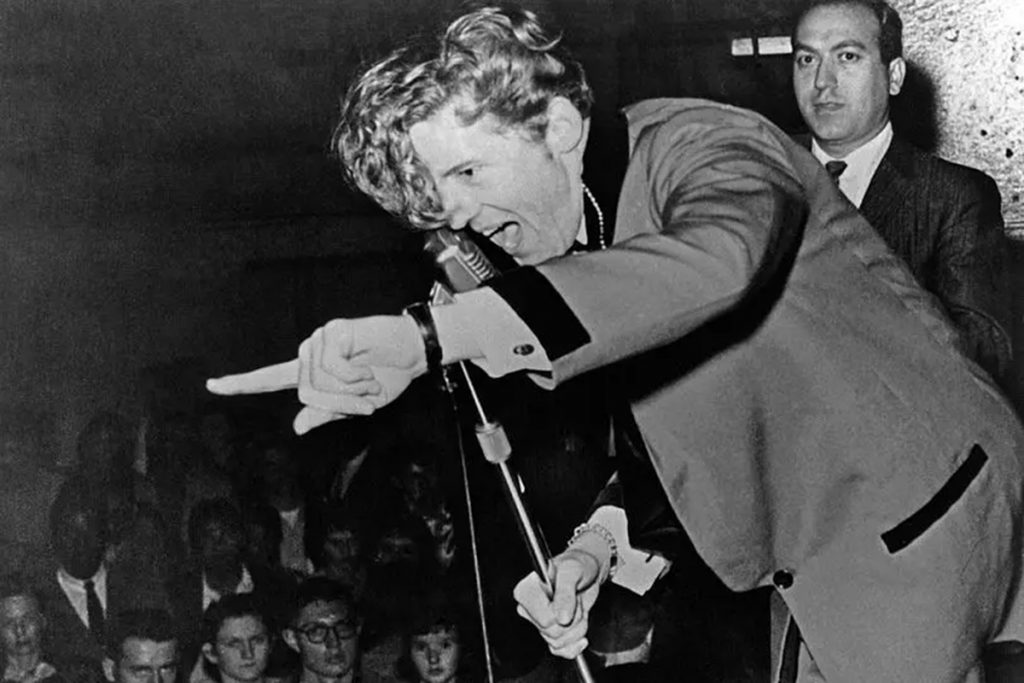Obituary: Jerry Lee Lewis, the Killer, meets his maker … or does he?

Jerry Lee Lewis performs in 1957 in Los Angeles as DJ Art Laboe looks on. Photo by Michael Ochs Archive/Getty Images.
Leave it to Jerry Lee Lewis to upend convention even as he was preparing to ascend to Heaven … or descend to another place altogether.
The Killer, as Jerry Lee was famously known, died Friday morning at his Memphis home at 87. Of course, his passing was reported prematurely (by TMZ) the day before, ensuring Lewis would generate at least an attention-getting ripple to end a tumultuous life.
Most of the first-generation American rockers were torn between the godly and the profane—perhaps none more than Jerry Lee Lewis, and for longer. He grew up in Ferriday, La., on the Mississippi River, with piano playing cousins Mickey Gilley and Jimmy Swaggart. Swaggart became a famous televangelist, while Gilley became a famous singer himself.
Jerry Lee Lewis straddled both worlds for decades, often incorporating gospel music into his live performances. A teenaged Lewis even studied at a Texas Bible school, but was expelled for playing a boogie-woogie version of “My God Is Real.”

Standing atop a piano, Jerry Lee Lewis gives an enthusiastic performance at the Cafe de Paris in New York City on June 10, 1958. Photo: Getty Images.
But he made his name playing what were, especially for their time, salacious rock ‘n’ roll songs (“Whole Lotta Shakin’ Goin On” and the single-entendre “Great Balls of Fire” were his earliest and biggest hits). Lewis, who even acknowledged these songs were the Devil’s music, had a little devil on one shoulder and tiny angel on the other for the rest of his life.
But in the late 1950s, just after Elvis Presley’s meteoric rise to fame, Lewis—with his long blond curls, piano pounding, salacious vocal delivery and arrogance borne of supreme talent—was the Devil Incarnate to many parents of teenagers. He made Elvis and his swivel-hips seem chaste by comparison. Lewis later called himself “a rompin’, stompin’, piano-playin’ son of a bitch,” and no one dared argue.
He even gave Elvis an honest if brief run for his money as the King of Rock and Roll, but it came crashing down when the world learned he had married his 13-year-old cousin, Myra (Jerry Lee was 22). He was largely blackballed for a time after that, and in 1958 went from headlining major rock shows to touring the decidedly second-tier club circuit through the 1960s and into the ’70s. The country music world would embrace him as one of their own, but he never totally abandoned rock and roll, or gospel music, for that matter.
And though he would never ascend to anything close to Elvis-level superstardom, Lewis eventually settled into a relatively comfortable spot as a country artist and rock legend. To this day, there really has never been another crazy piano-pumper like Lewis (though many have tried to be).
He lived the wild star life to the hilt, too—including alcohol and drug addiction—with tales like him setting a piano on fire onstage when forced to take second billing to Chuck Berry and, later, accidentally shooting his bass player. He had seven wives, two of whom died under mysterious circumstances. Nick Tosches’ 1982 biography, “Hellfire,” offers an entertaining treatment of the highs and lows of the Killer’s life up to that date. Lewis was also portrayed by Dennis Quaid in biopic “Great Balls of Fire.”
Almost as much as amazing ability to play, it was his attitude—un-housebroken, as rock ‘n’ roll as it gets—that landed him in the Rock and Roll Hall of Fame’s first group of inductees. That influenced generations of rockers after him (most of whom didn’t play piano). He was a rock star’s star. In 2006, long after his prime, a who’s who of rock royalty stepped in to do an album of duets with the Killer. Listen to his duet with Jimmy Page on “Rock and Roll”—a ’50s hero making a ’70s song his own in the 21st century.
I don’t know to what extent Jerry Lee made his peace with God before he passed. I’m confident I’m going to the Good Place when my time comes, and I hope I see the Killer there.
Follow journalist Sam Richards at Twitter.com/samrichardsWC.
